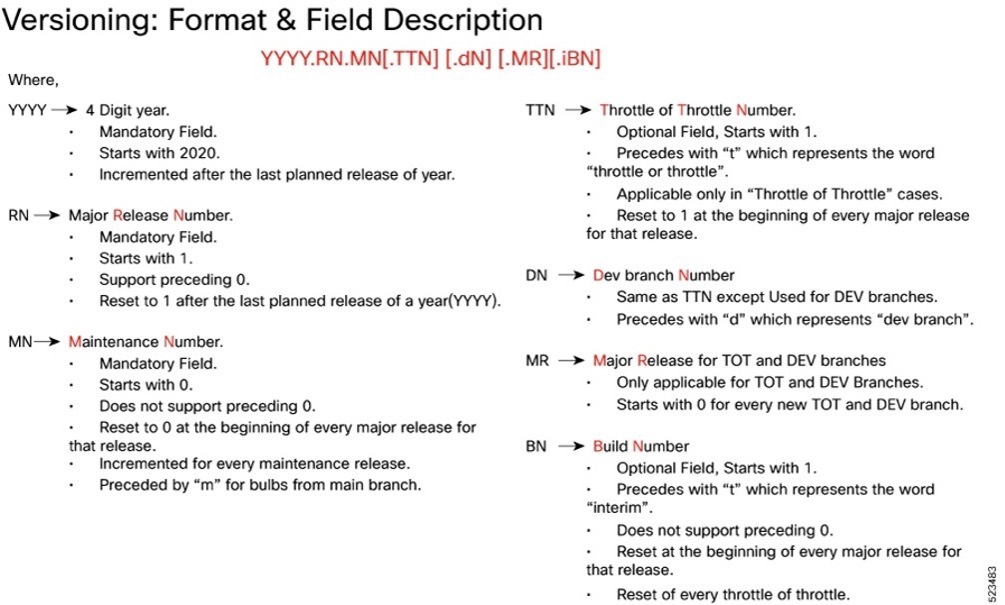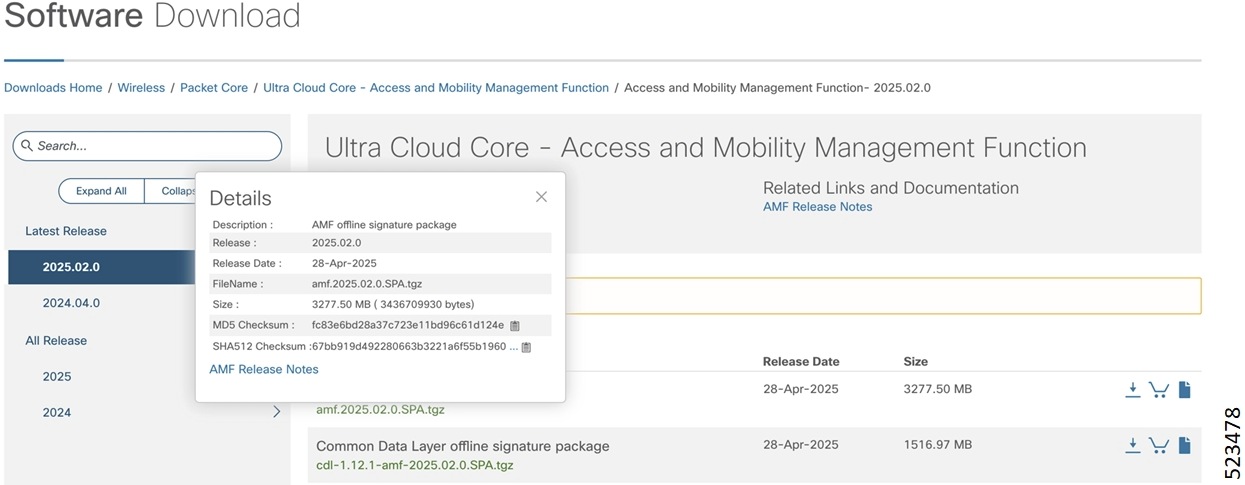Release Notes for UCC 5G AMF, Release 2025.04.0
Available Languages
Bias-Free Language
The documentation set for this product strives to use bias-free language. For the purposes of this documentation set, bias-free is defined as language that does not imply discrimination based on age, disability, gender, racial identity, ethnic identity, sexual orientation, socioeconomic status, and intersectionality. Exceptions may be present in the documentation due to language that is hardcoded in the user interfaces of the product software, language used based on RFP documentation, or language that is used by a referenced third-party product. Learn more about how Cisco is using Inclusive Language.
- US/Canada 800-553-2447
- Worldwide Support Phone Numbers
- All Tools
 Feedback
Feedback
Ultra Cloud Core - Access and Mobility Management Function, Release 2025.04.0
Ultra Cloud Core - Access and Mobility Management Function, Release 2025.04.0
The key highlights of this release include:
● Enhanced Network Reliability and Session Continuity: Introduction of AMF Sets, allowing multiple AMF instances to share user context and provide seamless service, even during failures. This feature ensures uninterrupted service by enabling quick takeover by another AMF in the set and supports spanning across different Kubernetes clusters and regions.
Note: This feature is not fully qualified in this release and is available only for testing purposes. For more information, contact your Cisco account representative.
● Enhanced Routing and High Availability: Introduction of Border Gateway Protocol (BGP) to enable dynamic, loop-free inter-domain routing between autonomous systems, allowing prioritization of service IP addresses and ensuring high availability through efficient traffic flow management and support for pod failovers.
● IPv6 Support for N26 Interface: Enhanced N26 interface to support IPv6 protocol, enabling the AMF to handle existing N26 message interactions with MME over IPv6, complementing the existing IPv4 support.
For more information on the AMF software products, see the Related resources section.
Release Lifecycle Milestones
This table provides EoL milestones for Cisco UCC AMF software:
Table 1. EoL milestone information for Ultra Cloud Core - Access and Mobility Management Function, Release 2025.04.0
| Milestone |
Date |
| First Customer Ship (FCS) |
31-Oct-2025 |
| End of Life (EoL) |
31-Oct-2025 |
| End of Software Maintenance (EoSM) |
01-May-2027 |
| End of Vulnerability and Security Support (EoVSS) |
01-May-2027 |
| Last Date of Support (LDoS) |
30-Apr-2028 |
These milestones and the intervals between them are defined in the Cisco Ultra Cloud Core (UCC) Software Release Lifecycle Product Bulletin available on cisco.com.
This section provides a brief description of the new software features introduced in this release.
Table 2. New software features for Ultra Cloud Core - Access and Mobility Management Function, Release 2025.04.0
| Product impact |
Feature |
Description |
| Upgrade |
AMF Set Deployment in Different Cluster
|
AMF Sets improve network reliability and session continuity by allowing multiple AMF instances to share user context and provide seamless service, even during failures. Multiple AMFs in an AMF Set share UE context using a centralized data lake (CDL) for synchronization. If one AMF fails, another in the set quickly takes over, ensuring uninterrupted service. AMF Sets can span different Kubernetes clusters and regions, with unique identifiers for each set and region. The system supports context sharing and subscriber migration across AMFs, with secure data stored and synchronized in the CDL. Command introduced: amf-services amf_services_name { guamis { mcc mcc_value | mnc mnc_value | region-id region_id | set-id set_id | pointer pointer_value { amf-name amf_name | backup-amf-name backup_amf_name | offline-mode } } } — Used to configure the amf-name and backup-amf-name for specific GUAMIs under AMF services. Default Setting: Disabled – Configuration Required |
| Software Reliability |
BGP feature enables dynamic, loop-free inter-domain routing between autonomous systems, allowing you to prioritize service IP addresses and ensure high availability. It works by using BGP speaker pods to advertise service IP addresses for incoming traffic and learn routes for outgoing traffic. BGP peers establish TCP connections and exchange routing information, with preference values determining traffic flow, especially in active-standby configurations. This feature also supports handling pod failovers and offers various commands for configuration and monitoring. Command introduced: router bgp local_as_number — Used to configure the autonomous systems (AS) and IP address for the BGP router. Default Setting: Disabled – Configuration Required |
|
| Upgrade |
AMF already supporting the N26 interface messages over IPv4 protocol is now enhanced to support the existing N26 message interaction with MME over IPv6 protocol. Command introduced: interface n26 { instancetype { dual | ipv4 | ipv6 } } — Used to set the IP stack type for the N26 interface. Default Setting: Disabled – Configuration Required |
There are no behavior changes in this release
This table lists the resolved issues in this specific software release.
Note: This software release may contain bug fixes first introduced in other releases. To see additional information, click the bug ID to access the Cisco Bug Search Tool. To search for a documented Cisco product issue, type in the browser: <bug_number> site:cisco.com
Table 3. Resolved issues for Ultra Cloud Core - Access and Mobility Management Function, Release 2025.04.0
| Bug ID |
Description |
| AMF does not send RINMR in SMC when NAS message container decoding fails |
|
| Collision b/w UE context Rel & Service Req is not handled properly |
There are no open issues in this release.
This section lists compatibility information of the Cisco UCC software products that are verified to work with this version of the UCC AMF software.
Table 4. Compatibility information for Ultra Cloud Core - Access and Mobility Management Function, Release 2025.04.0
| Product |
Supported Release |
| Ultra Cloud Core SMI |
2025.04.1.16 |
| Ultra Cloud CDL |
1.12.3 |
This section provides information about the release packages associated with UCC AMF software.
Table 5. Software packages for Ultra Cloud Core - Access and Mobility Management Function, Release 2025.04.0
| Software Package |
Version |
| amf.2025.04.0.SPA.tgz |
2025.04.0 |
| cdl-1.12.3.1-amf-2025.04.0.SPA.tgz |
1.12.3 |
| NED package |
ncs-6.4.8.1-amf-nc-1.1.2025.04.0 |
| NSO |
6.4.8.1 |
Cloud native product version numbering system
The show helm list command displays detailed information about the version of the cloud native product currently deployed.
 |
Image checksum information is available through Cisco.com Software Download Details. To find the checksum, hover the mouse pointer over the software image you have downloaded.

To validate the information, calculate a SHA512 checksum using the information in the following table and verify that it matches the one provided on the software download page.
To calculate a SHA512 checksum on your local desktop, see this table.
Table 6. SHA512 checksum calculation commands by operating system
| Operating System |
SHA512 checksum calculation command examples |
| Microsoft Windows |
Open a command line window and type the following command: > certutil.exe -hashfile <filename.extension> SHA512 |
| Apple MAC |
Open a terminal window and type the following command: $ shasum -a 512 <filename.extension> |
| Linux |
Open a terminal window and type the following command: $ sha512sum <filename.extension> OR $ shasum -a 512 <filename.extension> |
| <filename> is the name of the file. <extension> is the file type extension (for example, .zip or .tgz). |
|
If the SHA512 checksum does not match, we advise you not to attempt upgrading any systems with the corrupted software image. Download the software again and verify the SHA512 checksum again. If there is a constant mismatch, please open a case with the Cisco Technical Assistance Center.
The following table provides key resources and links to the essential documentation and support information for the Ultra Cloud Core AMF and Subscriber Microservices Infrastructure (SMI).
Table 7. Related resources and additional information
| Resource |
Link |
| AMF documentation |
|
| SMI documentation |
|
| Service Request and Additional information |
Cisco and the Cisco logo are trademarks or registered trademarks of Cisco and/or its affiliates in the U.S. and other countries. To view a list of Cisco trademarks, go to this URL: https://www.cisco.com/c/en/us/about/legal/trademarks.html. Third-party trademarks mentioned are the property of their respective owners. The use of the word partner does not imply a partnership relationship between Cisco and any other company. (1110R)
Any Internet Protocol (IP) addresses and phone numbers used in this document are not intended to be actual addresses and phone numbers. Any examples, command display output, network topology diagrams, and other figures in the document are shown for illustrative purposes only. Any use of actual IP addresses or phone numbers in illustrative content is unintentional and coincidental.
© 2025 Cisco Systems, Inc. All rights reserved.
 Feedback
Feedback